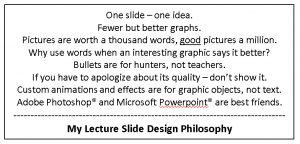This class covers a myriad of scientific subjects, incorporating ideas and concepts from a multitude of different disciplines. It is essential that you keep up with the material as we cover it, so as not to get lost in the maze of scientific arguments and concepts. Here is some tips on how to do well in this course:
 Take good notes. You will notice that my slides might be a little different from what you are used to in other classes. I have always been a visual learner and this is reflected in how my slides are designed. You will find few words, and even less bulleted text. I hope that this makes the lecture more visually interesting, engaging, and helps to keep your attention. On the flip side of that coin, however, is the fact that without hearing what I say about each slide, it is virtually impossible for you to reconstruct that information just by looking at the slides. It is therefore ESSENTIAL that you follow along carefully, and take good notes.
Take good notes. You will notice that my slides might be a little different from what you are used to in other classes. I have always been a visual learner and this is reflected in how my slides are designed. You will find few words, and even less bulleted text. I hope that this makes the lecture more visually interesting, engaging, and helps to keep your attention. On the flip side of that coin, however, is the fact that without hearing what I say about each slide, it is virtually impossible for you to reconstruct that information just by looking at the slides. It is therefore ESSENTIAL that you follow along carefully, and take good notes.- Review with and compare your notes to those of your peers. An incredibly effective way of assuring that your know what your notes refer to, is to go over them with at least one other (more is better) student in the class. See if you agree on what you noted as important. What parts did your peers emphasize and find important? Explain concepts to each other.
- Make Flashcards. You will be immersed in a myriad of scientific terms and jargon in this course. Treat this class like you would any FOREIGN language class. There are the vocabulary (terms and definitions), and the grammar (processes, mechanisms, relationships). Make notecards with all terms and concepts and take multiple 15-minute intervals every week (while waiting for the bus, for example) to go over them. You could cram all of them the day before the exam but that’s a poor way of creating lasting, long term memories and skills.
- Create your own exam. The way I write my exams is by going slide-by-slide through my lectures and writing ONE fact-checking question and ONE conceptual question for each slide. Then I go through and pick ~100 of those questions. Do the same. Take a look at each slide and think about what particular terms or facts are important. Then be able to put them into the process and/or context the slide seeks to explain. This is best done with a partner who then asks you their questions and you pose yours.
- Take the optional review quizzes. Each lecture topic comes with its own review quiz. These review quizzes are NOT meant to be exhaustive, exams might include different versions of questions, and additional questions not included in the review quizzes. The review quizzes are AIDS not guarantees of what will exactly be on the exam.

Recent Comments